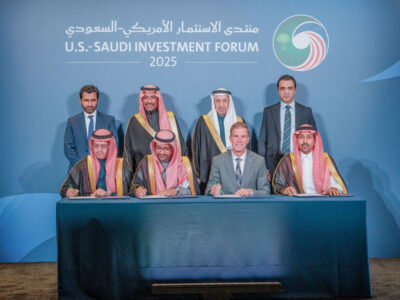Cybersecurity spending across the Gulf region is expected to more than double by 2030, reaching over AED120 billion, according to a new study by Grand View Research titled Cyber Resilience in the Gulf: Where Technology Meets Sovereign Risk (2025 Edition).
The report highlights how artificial intelligence, sovereign cloud strategies, and hyperscale data infrastructure are transforming national resilience across the GCC.
The Middle East and Africa cybersecurity sector generated AED60.6 billion in 2024 and is forecast to reach AED120.7 billion by 2030, growing at a compound annual rate of 12.5 per cent. The UAE and Saudi Arabia will account for more than 60 per cent of that investment, as both nations accelerate digital transformation through Vision 2030 and Net Zero 2050.
Grand View Research’s Managing Director, Swayam Dash, said the region’s rapid digital growth has made cyber resilience a matter of national sovereignty. “Cyber resilience has evolved from a technical discipline to a sovereign capability – it now defines how nations sustain growth, attract capital, and maintain public trust,” he said.
In the UAE, cybersecurity investment is being directed toward AI-driven threat intelligence, zero-trust frameworks, and sovereign cloud ecosystems under the national Cybersecurity Strategy 2025–31. The country’s AI cybersecurity market is expected to grow from AED4.4 billion to AED19.7 billion by 2030, while zero-trust frameworks are set to triple in value to AED3.47 billion.
Saudi Arabia is following a similar trajectory, with AI-based cybersecurity revenues projected to rise from AED4.6 billion to AED16.5 billion by 2030. The Kingdom’s National Cybersecurity Authority (NCA) and the Saudi Data and Artificial Intelligence Authority (SDAIA) are embedding cyber resilience into key Vision 2030 infrastructure projects.
The report notes a major shift “from firewalls to frameworks,” as Gulf nations move toward integrated policies, continuity planning, and cross-border cooperation. Milestones include Abu Dhabi Global Market’s Cyber Risk Management Framework and Saudi Arabia’s cyber stress-testing regime.
“The Gulf’s next global advantage won’t come from faster networks, but from networks that never fail,” Dash concluded, adding that the region’s unified governance and long-term investment make it a model for sovereign digital resilience worldwide.








